- Home
- Fredric Brown
The Second Fredric Brown Megapack: 27 Classic Science Fiction Stories Page 23
The Second Fredric Brown Megapack: 27 Classic Science Fiction Stories Read online
Page 23
“Mike,” I said. “Come here.”
She joined me at the window and we stood there, watching. My arm was around her. I don’t remember putting it there, but I didn’t take it away, and she didn’t move.
Behind us, Reagan cleared his throat, He said, “I’ll give this much of the list to the operator. He can get it on the ether right after midperiod.” He went out and shut the door behind him.
Michaelina seemed to move a little closer. We were both looking out the window at Placet rushing toward us. She said, “Beautiful, isn’t it, Phil?”
“Yes,” I said. But I turned, and I was looking at her face as I said it. Then—I hadn’t meant to—I kissed her.
I went back, and sat down at my desk, She said, “Phil, what’s the matter? You haven’t got a wife and six kids hidden away somewhere, or something, have you? You were single when I had a crush on you at Earth Polytech—and I waited five years to get over it and didn’t, and finally wangled a job on Placet just to—Do I have to do the proposing?”
I groaned. I didn’t look at her. I said, “Mike, I’m nuts about you. But—just before you came, I sent a two-word radiotype to Earth. It said, ‘I quit.’ So I’ve got to leave Placet on this shuttle of the Ark, and I doubt if I can even get a teaching job, now that I’ve got Earth Center down on me, and—”
She said, “But, Phil!” and took a step toward me.
There was a knock on the door, Reagan’s knock. I was glad, for once, of the interruption. I called out for him to come in, and he opened the door.
He said, “You told Mike yet, Chief?”
I nodded, glumly.
Reagan grinned. “Good,” he said; “I’ve been busting to tell her. It’ll be swell to see Ike again.”
“Huh?” I said. “Ike who?”
Reagan’s grin faded. He said, “Phil, are you slipping, or something? Don’t you remember giving me the answer to that Earth Center radiotype four days ago, just before Mike got here?”
I stared at him with my mouth open. I hadn’t even read that radiotype, let alone answered it. Had Reagan gone psychopathic, or had I? I remembered shoving it in the drawer of my desk. I jerked open the drawer and pulled it out. My hand shook a little as I read it: REQUEST FOR ADDITIONAL ASSISTANT GRANTED. WHOM DO YOU WANT FOR THE JOB?
I looked up at Reagan again. I said, “You’re trying to tell me I sent an answer to this?”
He looked as dumbfounded as I felt.
“You told me to,” he said.
“What did I tell you to send?”
“Ike Witt.” He stared at me. “Chief, are you feeling all right?”
I felt so all right something seemed to explode in my head. I stood up and started for Michaelina. I said, “Mike, will you marry me?” I got my arms around her, just in time, before midperiod closed down on us, so I couldn’t see what she looked like, and vice versa. But over her shoulder, I could see what must be Reagan. I said, “Get out of here, you ape,” and I spoke quite literally because that’s exactly what he appeared to be. A bright yellow ape.
The floor was shaking under my feet, but other things were happening to me, too, and I didn’t realize what the shaking meant until the ape turned back and yelled, “A flight of birds going under us, Chief! Get out quick, before—”
But that was as far as he got before the house fell down around us and the tin roof hit my head and knocked me out. Placet is a crazy place. I like it.
HONEYMOON IN HELL
On September 16th in the year 1962, things were going along about the same as usual, only a little worse. The cold war that had been waxing and waning between the United States and the Eastern Alliance—Russia, China, and their lesser satellites—was warmer than it had ever been. War, hot war, seemed not only inevitable but extremely imminent.
The race for the Moon was an immediate cause. Each nation had landed a few men on it and each claimed it. Each had found that rockets sent from Earth were inadequate to permit establishment of a permanent base upon the Moon, and that only establishment of a permanent base, in force, would determine possession. And so each nation (for convenience we’ll call the Eastern Alliance a nation, although it was not exactly that) was engaged in rushing construction of a space station to be placed in an orbit around Earth.
With such an intermediate step in space, reaching the Moon with large rockets would be practicable and construction of armed bases, heavily garrisoned, would be comparatively simple. Whoever got there first could not only claim possession, but could implement the claim. Military secrecy on both sides kept from the public just how near to completion each space base was, but it was generally—and correctly—believed that the issue would be determined within a year, two years at the outside.
Neither nation could afford to let the other control the Moon. That much had become obvious even to those who were trying desperately to maintain peace.
On September 17th, 1962, a statistician in the birth record department of New York City (his name was Wilbur Evans, but that doesn’t matter) noticed that out of 813 births reported the previous day, 657 had been girls and only 156 boys.
He knew that, statistically, this was practically impossible. In a small city where there are only, say, ten births a day, it is quite possible—and not at all alarming—that on any one given day, 90% or even 100%, of the births may be of the same sex. But out of so large a figure as 813, so high a ratio as 657 to 156 is alarming.
Wilbur Evans went to his department chief and he, too, was interested and alarmed. Checks were made by telephone—first with nearby cities and, as the evidence mounted, with more and more distant ones.
By the end of that day, the puzzled investigators—and there was quite a large group interested by then—knew that in every city checked, the same thing had happened. The births, all over the Western Hemisphere and in Europe, for that day had averaged about the same—three boys for every thirteen girls.
Back-checking showed that the trend had started almost a week before, but with only a slight predominance of girls. For only a few days had the discrepancy been obvious. On the fifteenth, the ratio had been three boys to every five girls and on the sixteenth it had been four to fourteen.
The newspapers got the story, of course, and kicked it around. The television comics had fun with it, if their audiences didn’t. But four days later, on September 21st, only one child out of every eighty-seven born in the country was male. That wasn’t funny. People and governments started to worry; biologists and laboratories who had already started to investigate the phenomenon made it their number one project. The television comics quit joking about it after one crack on the subject by the top comedian in the country drew 875,480 indignant letters and lost him his contract.
On September 29th, out of a normal numbers of births in the United States, only forty-one were boys. Investigation proved that every one of these was a late, or delayed, birth. It became obvious that no male child had been conceived, during the latter part of December of the previous year, 1961. By this time, of course, it was known that the same condition prevailed everywhere—in the countries of the Eastern Alliance as well as in the United States, and in every other country and area of the world—among the Eskimos, the Ubangi and the Indians of Tierra del Fuego.
The strange phenomenon, whatever it was, affected human beings only, however. Births among animals, wild or domesticated, showed the usual ratio of the two sexes.
Work on both space stations continued, but talk of war—and incidents tending to lead to war—diminished. The human race had something new, something less immediate, but in the long run far worse to worry about. Despite the apparent inevitability of war, few people thought that it would completely end the human race; a complete lack of male children definitely would. Very, very definitely.
And for once something was happening that the United States could not blame on the Eastern Alliance, and vice versa. The Orient—China and India in particular—suffered more, perhaps, than the Occident, for in those countries ma
le offspring are of supreme emotional importance to parents. There were riots in both China and India, very bloody ones, until the people realized that they didn’t know whom or what they were rioting against and sank back into miserable passivity.
In the more advanced countries, laboratories went on twenty-four-hour shifts, and anyone who knew a gene from a chromosome could command his weight in paper currency for looking—however futilely—through a microscope. Accredited biologists and geneticists became more important than presidents and dictators. But they accomplished no more than the cults which sprang up everywhere (though mostly in California) and which blamed what was happening on everything from a conspiracy of the Elders of Zion to (with unusually good sense) an invasion from space, and advocated everything from vegetarianism to (again with unusually good sense) a revival of phallic worship.
Despite scientists and cults, despite riots and resignation, not a single male child was born anywhere in the world during the month of December, 1962. There had been isolated instances, all quite late births, during October and November.
January of 1963 again drew a blank. Not that everyone qualified wasn’t trying.
Except, perhaps, the one person who was slated to do more than anyone else—well, almost anyone else—about the matter.
Not that Capt. Raymond E. Carmody, U.S.S.E, retired, was a misogamist, exactly. He liked women well enough, both in the abstract and in the concrete. But he’d been badly jilted once and it had cured him of any desire whatsoever for marriage. Marriage aside, he took women as he found them—and he had no trouble finding them.
For one thing, don’t let the word “retired” fool you. In the Space Service, rocket pilots are retired at the ripe old age of twenty-five. The recklessness, reaction-speed and stamina of youth are much more important than experience. The trick in riding a rocket is not to do anything in particular; it’s to be tough enough to stay alive and sane until you get there. Technicians do the brain-work and the only controls are braking rockets to help you get down in one piece when you land; reaction-speed is of more importance than experience in managing them. Neither speed nor experience helps you if you’ve gone batty en route from spending days on end in the equivalent of a coffin, or if you haven’t what it takes not to die in a good landing. And a good landing is one that you can walk away from after you’ve recovered consciousness.
That’s why Ray Carmody, at twenty-seven, was a retired rocket pilot. Aside from test flights on and near Earth, he’d made one successful flight to the Moon with landing and return. It had been the fifteenth attempt and the third success. There had been two more successful flights thereafter—altogether five successful round trips out of eighteen tries.
But each rocket thus far designed had been able, barely, to carry fuel to get itself and its crew of one back to Earth, with almost-starvation rations for the period required. Step-rockets were needed to do even that, and step-rockets are terrifically expensive and cumbersome things.
At the time Carmody had retired from the Space Service, two years before, it had been conceded that establishment of a permanent base of any sort on the Moon was completely impracticable until a space station, orbited around the Earth, had been completed as a way-station. Comparatively huge rockets could reach a space station with relative ease, and starting from a station in open space and against lesser gravitational pull from Earth, going the rest of the way to the Moon would be even simpler.
But we’re getting away from Ray Carmody, as Carmody had got away from the Space Service. He could have had a desk job in it after old age had retired him, a job that would have paid better than he was making at the moment. But he knew little about the technical end of rocketry, and he knew less, and cared nothing, about administrative detail work. He was most interested in cybernetics, which is the science of electronic calculating machines. The big machines had always fascinated him, and he’d found a job working with the biggest of them all, the one in the building on a corner of the grounds of the Pentagon that had been built, in 1958, especially to house it.
It was, of course, known as Junior to its intimates.
Carmody’s job, specifically, was Operative, Grade I, and the Grade I meant that—despite his fame as one of the few men who had been to the Moon and lived to tell about it, and despite his ultra-honorable discharge with the grade of captain—his life had been checked back to its very beginning to be sure that he had not, even in his cradle, uttered a careless or subversive word.
There were only three other Grade I Operatives qualified to ask Junior questions and transmit his answers on questions which involved security—and that included questions on logistics, atomics, ballistics and rocketry, military plans of all sorts and everything else the military forces consider secret, which is practically everything except the currently preferred color of an infantryman’s uniform.
The Eastern Alliance would undoubtedly have traded three puppet dictators and the tomb of Lenin to have had an agent, or even a sympathizer, as a Grade I Operative on Junior. But even the Grade II Operatives, who handled only problems dealing with non-classified matters, were checked for loyalty with extreme care. Possibly lest they might ask Junior a subversive question or feed a subversive idea into his electronic equivalent of a brain.
But be that as it may, on the afternoon of February 2, 1963, Ray Carmody was the Operative on duty in the control room. The only Operative, of course; dozens of technicians were required from time to time to service Junior and feed him, but only one Operative at a time fed data into him or asked him questions. So Carmody was alone in the soundproofed control room.
Doing nothing, however, at the moment. He’d just fed into Junior a complicated mess of data on molecular structure in the chromosome mechanism and had asked Junior—for the ten-thousandth time, at least—the sixty-four dollar question bearing on the survival of the human race: Why all children were now females and what could be done about it.
It had been quite a chunk of data, this time, and no doubt Junior would take quite a few minutes to digest it, add it to everything else he’d ever been told and synthesize the whole. No doubt in a few minutes he’d say, “Data insufficient.” At least to this moment that had been his only answer to the sixty-four dollar question.
Carmody sat back and watched Junior’s complicated bank of dials, switches and lights with a bored eye. And because the intake-mike was shut off and Junior couldn’t hear what he was saying anyway, and because the control room was soundproofed so no one else could hear him, either, he spoke freely.
“Junior,” he said, “I’m afraid you’re a washout on this particular deal. We’ve fed you everything that every geneticist, every chemist, every biologist in this half of the world knows, and all you do is come up with that ‘data insufficient’ stuff. What do you want—blood?”
“Oh, you’re pretty good on some things. You’re a whiz on orbits and rocket fuels, but you just can’t understand women, can you? Well, I can’t either; I’ll give you that. And I’ve got to admit you’ve done the human race a good turn on one deal—atomics. You convinced us that if we completed and used H-bombs, both sides would lose the coming war. I mean lose. And we’ve got inside information that the other side got the same answer out of your brothers, the cybernetics machines over there, so they won’t build or use them, either. Winning a war with H-bombs is about like winning a wrestling match with hand grenades; it’s just as unhealthful for you as for your opponent. But we weren’t talking about hand grenades. We were talking about women. Or I was. Listen, Junior—”
A light, not on Junior’s panel but in the ceiling, flashed on and off, the signal for an incoming intercommunicator call. It would be from the Chief Operative, of course; no one else could connect—by intercommunicator or any other method—with this control room.
Carmody threw a switch.
“Busy, Carmody?”
“Not at the moment, Chief. Just fed Junior that stuff on molecular structure of genes and chromosomes. Waiting for him to tel
l me it’s not enough data, but it’ll take him a few minutes yet.”
“Okay. You’re off duty in fifteen minutes. Will you come to my office as soon as you’re relieved? The President wants to talk to you.”
Carmody said, “Goody. I’ll put on my best pinafore.”
He threw the switch again. Quickly, because a green light was flashing on Junior’s panel.
He reconnected the intake and output-mikes and said, “Well, Junior?”
“Data insufficient,” said Junior’s level mechanical voice.
Carmody sighed and noted the machine’s answer on the report ending in a question which he had fed into the mike. He said, “Junior, I’m ashamed of you. All right, let’s see if there’s anything else I can ask and get an answer to in fifteen minutes.”
He picked up a pile of several files from the table in front of him and leafed through them quickly. None contained fewer than three pages of data.
“Nope,” he said, “not a thing here I can give you in fifteen minutes, and Bob will be here to relieve me then.”
He sat back and relaxed. He wasn’t ducking work; experience had proven that, although an AE7 cybernetics machine could accept verbal data in conformance with whatever vocabulary it had been given, and translate that data into mathematical symbols (as it translated the mathematical symbols of its answer back into words and mechanically spoke the words), it could not adapt itself to a change of voice within a given operation. It could, and did, adjust itself to understanding, as it were, Carmody’s voice or the voice of Bob Dana who would shortly relieve him. But if Carmody started on a given problem, he’d have to finish it himself, or Bob would have to clear the board and start all over again. So there was no use starting something he wouldn’t have time to finish.
He glanced through some of the reports and questions to kill time. The one dealing with the space station interested him most, but he found it too technical to understand.

 Hall of Mirrors
Hall of Mirrors Honeymoon in Hell
Honeymoon in Hell The Shaggy Dog and Other Murders
The Shaggy Dog and Other Murders The Far Cry
The Far Cry Arena
Arena Mostly Murder
Mostly Murder The Geezenstacks
The Geezenstacks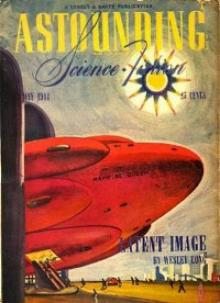 The Yehudi Principle
The Yehudi Principle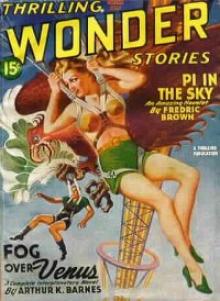 Pi in the Sky
Pi in the Sky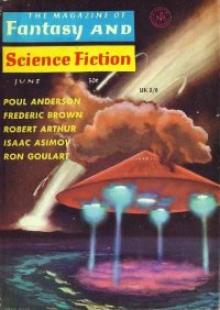 Eine Kleine Nachtmusik
Eine Kleine Nachtmusik Etaoin Shrdlu
Etaoin Shrdlu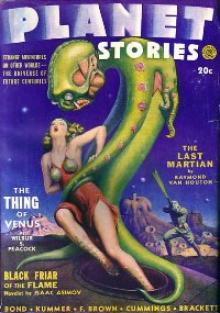 The Star Mouse
The Star Mouse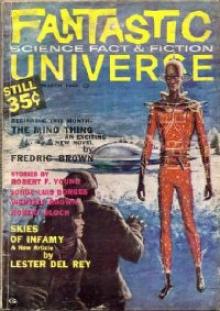 The Mind Thing
The Mind Thing The Screaming Mimi
The Screaming Mimi The Fabulous Clipjoint
The Fabulous Clipjoint Puppet Show
Puppet Show It Didn't Happen
It Didn't Happen Madball
Madball Happy Ending
Happy Ending The Fredric Brown Megapack: 33 Classic Science Fiction Stories
The Fredric Brown Megapack: 33 Classic Science Fiction Stories Rogue in Space
Rogue in Space Night of the Jabberwock
Night of the Jabberwock The Dead Ringer
The Dead Ringer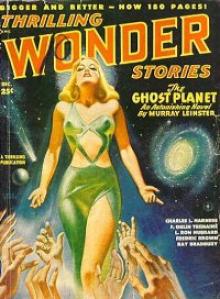 Knock
Knock We All Killed Grandma
We All Killed Grandma Space On My Hands
Space On My Hands The Collection
The Collection The Second Fredric Brown Megapack: 27 Classic Science Fiction Stories
The Second Fredric Brown Megapack: 27 Classic Science Fiction Stories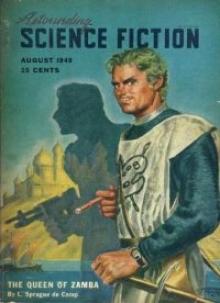 Letter to a Phoenix
Letter to a Phoenix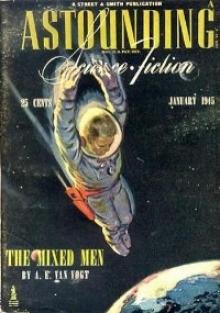 The Waveries
The Waveries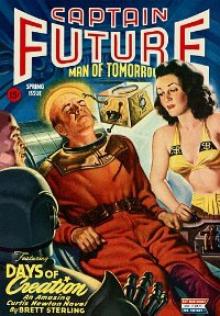 Nothing Sirius
Nothing Sirius The Deep End
The Deep End Nightmares & Geezenstacks
Nightmares & Geezenstacks Come and Go Mad
Come and Go Mad Martians, Go Home
Martians, Go Home